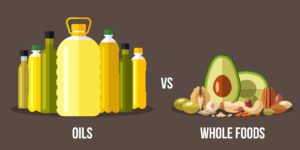
In the quest for a healthier lifestyle, the choices we make regarding our dietary habits play a vital role. Oil, in particular, is an essential component of many culinary endeavors, bringing flavor and texture to our favorite dishes. Cooking oil plays a crucial role in our diet, adding flavor and richness to our meals. But beyond its taste-enhancing qualities, oil is an important component of a balanced and healthy diet. It provides us with essential fatty acids and fat-soluble vitamins, helps in the absorption of nutrients, and supports overall well-being.
There are two popular options when it comes to choosing the right oil for your wellness journey: avocado oil vs. vegetable oil. In this article, the nutrition experts at San Antonio’s Local Health Market are going to compare and contrast the two, examining their health benefits, impact on heart health, environmental factors, and more. By the end, you should have a much better understanding of the benefits each oil has to offer. This knowledge will enable you to make healthier diet choices when it comes to avocado oil vs vegetable oil.
Exploring the Nutritional Composition of Avocado Oil and Vegetable Oil
Avocado oil is derived from the flesh of the avocado fruit and is known for its high monounsaturated fat content. It also contains omega-3 fatty acids, vitamin E, and antioxidants. Avocado oil has a rich, buttery flavor, making it a popular choice for cooking, dressing salads, and even skincare.
On the other hand, vegetable oil is a broad term that encompasses various oils derived from different plant sources, such as soybeans, corn, canola, and sunflower seeds. It typically contains a mix of polyunsaturated and monounsaturated fats. Vegetable oil has a neutral taste, making it versatile for different cooking methods, from frying to baking.
In our comparative analysis, we aim to explore the incredible advantages these two commonly used cooking oils offer. By examining their unique properties, we can shed light on the many advantages each one provides:
Both avocado oil and vegetable oil contribute to maintaining a healthy heart. Avocado oil is rich in monounsaturated fats that aid in reducing bad cholesterol levels (LDL) while increasing good cholesterol (HDL). On the other hand, Vegetable oil, with its polyunsaturated fats, helps lower overall cholesterol levels, thus promoting cardiovascular well-being.
Avocado oil stands out as a nutritional powerhouse. It’s packed with essential vitamins and minerals. It boasts high levels of vitamin E, a potent antioxidant that protects our cells from damage. Additionally, it contains beneficial phytosterols that aid in reducing inflammation and improving overall immune function. Although less nutrient-dense than avocado oil, vegetable oil still provides a decent amount of vitamin E, contributing to our daily nutritional requirements.
When it comes to weight management, avocado oil takes the lead. Its monounsaturated fats help control appetite, keeping us feeling fuller longer. Moreover, these healthy fats assist in boosting metabolism, aiding in weight loss efforts. While vegetable oil can also be part of a balanced diet, its higher calorie content necessitates moderation for those aiming to shed pounds.
Avocado oil emerges as a champion in the realm of skincare and haircare. Its moisturizing properties make it an excellent natural remedy for dry skin and hair. The oil’s high vitamin E content nourishes and rejuvenates the skin, promoting a youthful appearance.
Regularly applying avocado oil can alleviate dryness, reduce inflammation, and even soothe conditions like eczema and psoriasis. Embrace the natural goodness of avocado oil to unlock a radiant and healthy complexion.
Avocado oil and vegetable oil are both packed with antioxidants that combat harmful free radicals in our bodies. These antioxidants, such as vitamin E, protect our cells from oxidative stress, reducing the risk of chronic diseases like cancer and inflammation-related conditions. Including these oils in your diet can provide a natural defense against the damaging effects of free radicals.
In this section, we’re going to analyze two popular cooking oils, avocado oil and vegetable oil, and their impact on the taste, texture, and quality of dishes.
In the ultimate showdown between avocado oil and vegetable oil, both have unique qualities and health benefits.
Avocado oil stands out with its rich monounsaturated fats and potential anti-inflammatory properties, while vegetable oil offers versatility and a range of options for different cooking methods.
Considering factors such as taste preferences, nutritional needs, and environmental impact, you can make informed choices on which oil to incorporate into your wellness journey. Remember, moderation and balance are key.
Contact San Antonio’s Local Health Market to learn more about the characteristics and benefits associated with both avocado oil and vegetable oil. Our goal is to provide you with the knowledge you need to prioritize your overall well-being through healthy diet choices.
Lorem ipsum dolor sit amet consectetur. Maecenas dui mauris volutpat est quisque ac. Dictum tincidunt amet vivamus elementum aliquet velit in hendrerit. Scelerisque elit id sapien tincidunt et ut viverra mi. Semper ut faucibus elit viverra et egestas. Nulla risus adipiscing dictum sit ullamcorper a gravida purus velit. Commodo consectetur non orci sit ultrices auctor faucibus. Dictum amet in accumsan sed est velit. Cras tortor mattis cras elementum fermentum vitae. Vel risus eu dui libero sed penatibus semper. Pharetra feugiat ut sed mauris ac
Lorem ipsum dolor sit amet consectetur. Maecenas dui mauris volutpat est quisque ac. Dictum tincidunt amet vivamus elementum aliquet velit in hendrerit. Scelerisque elit id sapien tincidunt et ut viverra mi. Semper ut faucibus elit viverra et egestas.
Lorem ipsum dolor sit amet consectetur. Maecenas dui mauris volutpat est quisque ac. Dictum tincidunt amet vivamus elementum aliquet velit in hendrerit. Scelerisque elit id sapien tincidunt et ut viverra mi. Semper ut faucibus elit viverra et egestas.
Lorem ipsum dolor sit amet consectetur. Maecenas dui mauris volutpat est quisque ac. Dictum tincidunt amet vivamus elementum aliquet velit in hendrerit. Scelerisque elit id sapien tincidunt et ut viverra mi. Semper ut faucibus elit viverra et egestas.
Lorem ipsum dolor sit amet consectetur. Maecenas dui mauris volutpat est quisque ac. Dictum tincidunt amet vivamus elementum aliquet velit in hendrerit. Scelerisque elit id sapien tincidunt et ut viverra mi. Semper ut faucibus elit viverra et egestas.
Don’t miss out on the latest health tips, meal benefits, and updates from Local Health Market. Subscribe to our blog and get fresh inspiration delivered straight to your inbox.
Whether you’re ordering meals, connecting with our nutritionist, or browsing in-store options, Local Health Market is here to make your health journey simple, convenient, and oh-so-delicious.

Subscribe & save 10%!


But don’t let that stop you from enjoying nutritious meals. Stop by Local Health Market to grab prepared meals in person; we’re open seven days a week and would love to see you!
Browse our mouthwatering menu to see all the options available for Sunday delivery.